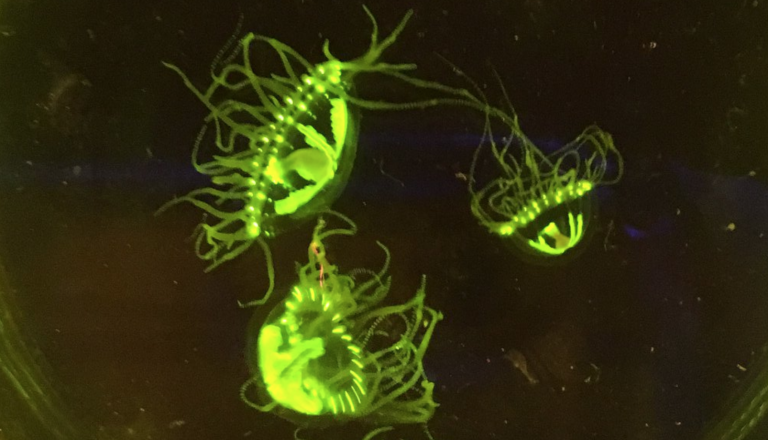Clinging jellyfish once again found in N.J. river
The small jellyfish, found in an area off Monmouth Beach known as "the Hook," may indicate the start of a bloom.

Clinging jellyfish (Courtesy of Dr. Paul Bologna/Montclair State University)
A tiny invasive jellyfish that packs a powerful sting has once again been found in a Jersey Shore river.
Dr. Paul Bologna, a Montclair State University professor and jellyfish expert, says 40 dime-sized clinging jellyfish were recently discovered in Monmouth County’s Shrewsbury River.
The small jellyfish, found in an area off Monmouth Beach known as “the Hook,” may indicate the start of a bloom, according to the New Jersey Department of Environmental Protection.
Clinging jellyfish, native to the Pacific Ocean region, were first found in New Jersey in 2016 when a fisherman collected one near the Point Pleasant Canal in Ocean County. Dozens were then spotted in the Shrewsbury River. Officials don’t know how they arrived in New Jersey.
Oceanus Magazine describes the species as resembling “a piece of art glass or a flash bling brooch you would never want to wear” with “hula-hoop skirts of 60 to 90 glass-like tentacles that uncoil sharp threads and emit painful neurotoxin.”
A state news release advises that clinging jellyfish are not known to inhabit ocean beaches or other sandy areas.
Rather, they tend to attach themselves to “submerged aquatic vegetation and algae in back bays and estuaries — areas not heavily used for swimming,” according to the release.
Officials say anyone stung by the jellyfish should immediately treat the impacted area:
- Apply white vinegar to the affected area to immobilize any remaining stinging cells.
- Rinse the area with salt water and remove any remaining tentacle materials using gloves or a thick towel.
- A hot compress or cold pack can then be applied to alleviate pain.
- If symptoms persist or pain increases instead of subsiding, seek prompt medical attention.
Anyone who spots these jellyfish or anything unusual can post to the New Jersey Jellyspotters Facebook group.
WHYY is your source for fact-based, in-depth journalism and information. As a nonprofit organization, we rely on financial support from readers like you. Please give today.




